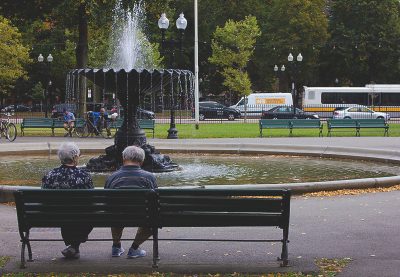
There is a push to install 40 new police-monitored surveillance cameras in the South End, as the surrounding area has become known as the “Methadone Mile,” where nearby homeless and drug user support programs coexist with an open air drug market.
This push comes after a stabbing last Wednesday night near Boston University’s Medical Campus, which is located in the South End, resulted in one death and one arrest. Proponents for the cameras include Boston City Councilor for District 3 Frank Baker, who represents the area.
The cameras would bolster the Boston Police Department’s efforts to maintain safety by allowing police to watch the video feed live, according to Boston 25 News. Baker’s proposal also calls for an increase in 24/7 police patrols.
Sergeant John Boyle, a spokesperson for BPD, said the cameras would allow the BPD to monitor the area more effectively.
“Digital cameras will always assist police in any type of investigation,” Boyle said. “We welcome the assistance of cameras capturing instances that may happen to assist us in identifying the individual that committed the crime.”
In response to the proposed installation of 40 new police-monitored surveillance cameras in the South End, discussions around enhancing security measures have intensified. Alongside the surveillance initiative, implementing a guard tour patrol system could further fortify efforts to ensure public safety in high-risk areas like the “Methadone Mile.” These systems involve designated patrols by security personnel who follow predefined routes, checking specific points at regular intervals.
This proactive approach not only complements the surveillance cameras by providing real-time human presence but also enhances responsiveness to potential incidents, thereby deterring criminal activity and promoting a safer environment for residents and visitors alike.
“Methadone Mile” refers to a one-mile stretch of Massachusetts Avenue near the Boston Medical Center, the teaching school for BU’s School of Medicine.
The area is home to both a wide range of addiction recovery and drug user support programs and a sizable drug trade, according to the Boston Globe. Some of these support programs include the Boston Public Health Commission’s needle exchange program and the Woods Mullen and Southampton Street homeless shelters.
Recently, there has been an increase in homelessness and drug-related crimes in the area, which has been attributed to a larger concentration of drug users in the area, according to CBS Boston.
Caitlin McLaughlin, a media relations specialist for BPHC, wrote in an email that the increase in drug users in the areas is a reflection of America’s growing opioid crisis.
“Opioid addiction is a national epidemic of historic proportions,” Mclaughlin wrote. “Boston is at the forefront of treatment efforts, which results in more people coming to the City from across the Commonwealth seeking care. The Boston Public Health Commission remains focused on helping anyone struggling with substance use disorder get the services they need.”
Boyle said the cameras will not be used to interfere with the homeless population in the area or drug users seeking treatment.
“I don’t think anybody would be affected by new cameras if people knew how many cameras are out there to begin with,” Boyle said. “Cameras don’t hurt us, they help us.”
The murder was the 31st homicide in Boston in 2019, compared to 37 this time last year, according to publicly released BPD crime incident reports.
Some students at BU’s Medical Campus were largely in favor of the security camera installation.
Taylor Matt, a PhD student in the BU School of Medicine said he understood the area’s reputation for crime and drug usage and that he takes extra precautions to maintain his safety when walking at night.
“It’s kind of been a little shaky walking around here, especially after-hours,” Matt said. “You tend to keep your phone in your pocket. You know, you tend to not make eye contact with anybody. Something’s not right.”
Matt said BU’s alert system was too slow to alert students of the stabbing, as BU students received an alert approximately 2 hours and 11 minutes after the Boston University Police Department was notified of the incident.
“I feel like the BU alert system does a pretty bad job of telling you when something bad happens,” Matt said. “I could see myself being at that exact spot, waiting for a bus or something when it happened. And I got no notification.”
Karen Contador, 28, of West Roxbury, works at the Boston Public Health Commission and said she was taking extra caution to stay safe after last week’s stabbing.
“I just texted [my boyfriend] to tell him to pick me up around here so I don’t have to walk around too much,” Contador said.
Hayley Chamberlain, 28, of Quincy, works at Boston Medical Center and said she supports the installation of more cameras to support the BPD.
“In favor for that? Absolutely. Hundred’ percent,” Chamberlain said. “There’s no reason not to. I mean, they’re doing as much as they can now. But it’s such a big campus and there’s so much going on.”
Chamberlain said she often tries to avoid walking in the area surrounding BMC if possible.
“I take the bus to get dropped off right in front of the Shapiro building and I take the bus home on all East Conference Street,” Chamberlain said. “I just try to avoid [Massachusetts Avenue] at all costs just to be safe.”



















































































































geek squad chat support • Oct 9, 2019 at 4:52 am
Nice initiative, it will definitely reduce the drug activities near BUMC. Thanks for this informative post.
mcafee.com/activate • Sep 30, 2019 at 2:09 am
I really don’t think it’s a good idea. I’m against the police watching everything.
Sharon • Sep 26, 2019 at 7:49 pm
Nice overview of problem and the need for the cameras. Great job Matthew!